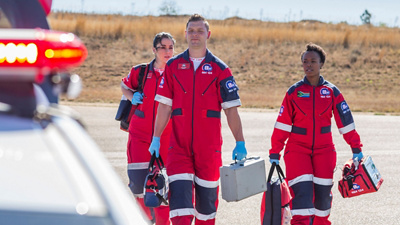Stacey-Lee Alcock completed a four-year university degree to become an ER24 ECP at the West Metro branch. This is the highest ER24 qualification for road operations.
How did you first get into emergency medicine?
For as long as I can remember, I’ve loved three things – God, people, and medicine. I believed being a doctor would help me combine those passions, so I worked hard to get into medical school. However, five years and 25 rejection letters later, I was starting to give up on my dream.
In 2015, I was diagnosed with bone cancer and had to undergo surgery, a bone marrow transplant, and radiation. This gave me a whole new perspective on life – I refused to wait any longer to be handed the opportunity to help people. I subsequently completed a Basic Ambulance Assistant course and worked in an ambulance for the first time. I fell in love with emergency medical services (EMS) and everything that comes with it, including the rare and profound privilege of being with people in their scariest, happiest, most heart-wrenching, and even final moments on this earth. After many years of studying and lots of hard work, my love affair with EMS continues.
What has your career trajectory been?
I’ve been privileged to earn multiple study scholarships. After completing a Bachelor's degree in Ministry, I worked as a youth pastor for a while. I then studied a BSc in Microbiology and Physiology. After that, I completed my Basic Ambulance Assistant course and progressed to the four-year Bachelor’s degree in Emergency Medical Care. I’m now an operational Emergency Care Practitioner (ECP), as well as a qualified microbiologist and physiologist.
What are the challenges of your role?
As an ER24 ECP, I’m a shift leader in addition to the usual responsibilities of the role, such as patient care and administration. The nature of EMS, especially in a leadership position, presents challenges in every sphere:
- Physical – long shifts, heavy equipment and patients, extreme environments, and night shifts, often resulting in 24-hour periods without any sleep.
- Mental – cognitive overload, as I must keep abreast of ever-developing knowledge to give the best patient care.
- Emotional – constant exposure to unimaginable grief, fear, and trauma is taxing. Working with teams of different cultures, methods, qualifications, and personalities is also demanding.
- Spiritual – the temptation to question everything; and the constant struggle to maintain balance between my patients and my own family.
What are the highlights?
Despite all these challenges, being able to make even the smallest difference makes it all worth the early mornings, missed Christmas dinners, and money spent on coffee to get through the shift! Sometimes, the simple act of holding the hand of a frail 93-year-old woman, fearful that her recent fall was the final nail in the coffin of her independence, is the reward. Sometimes, it’s more dramatic – like ripping a child from the clutches of death.
What qualifications does an ECP need?
You need a four-year Bachelor's degree in Emergency Medical Care and to register with the Health Professions Council of South Africa.
What personal qualities does a good ER24 ECP need?
Being an ECP in the South African pre-hospital setting takes a lot of personal strength and character. It requires qualities such as humility, empathy, compassion, teachability, self-awareness, assertiveness, and leadership.


